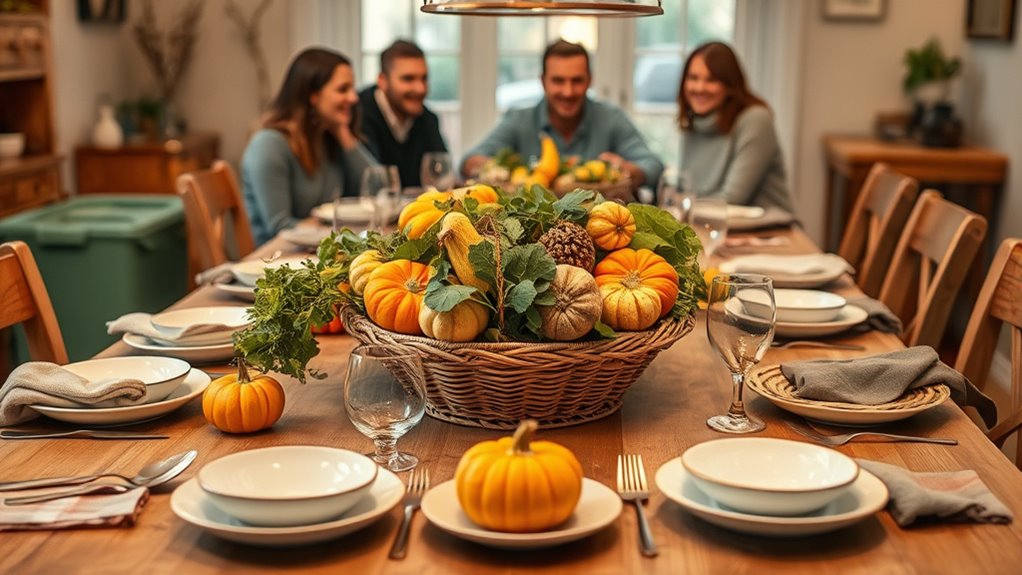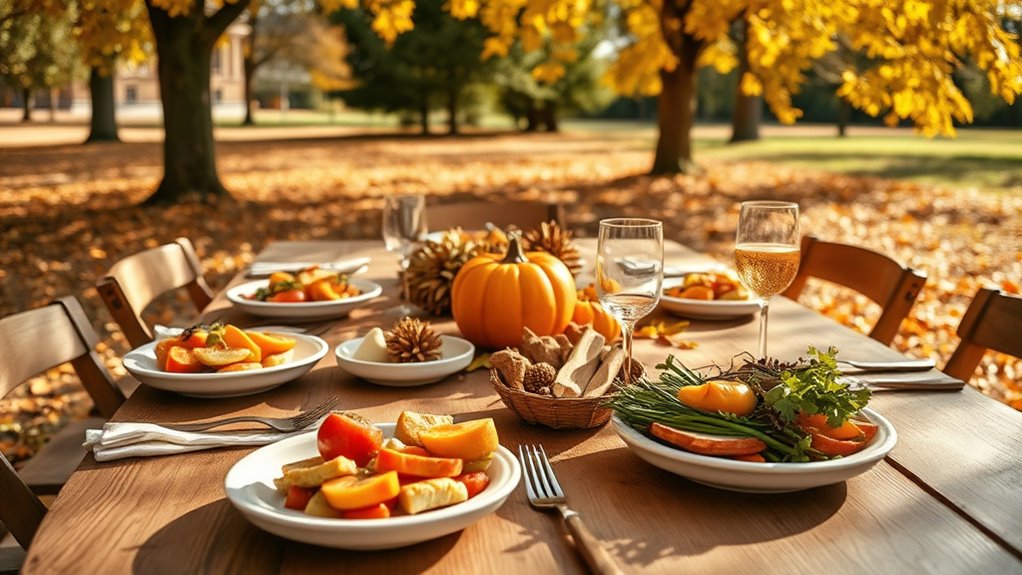For a low-waste Thanksgiving, focus on reducing food and packaging waste by buying only what you’ll consume, using compostable tableware, and encouraging guests to bring reusable containers. Set up a compost bin for vegetable scraps and avoid composting meat or dairy to prevent pests. Incorporate eco-friendly habits like reusing tableware and packaging, and explore mindful planning to minimize excess waste. Keep these tips in mind to celebrate sustainably—if you continue exploring, you’ll discover even more eco-friendly ideas to make your holiday greener.
Key Takeaways
- Use compostable tableware and packaging to reduce single-use waste during the celebration.
- Plan menus with minimal leftovers and donate excess food to prevent waste.
- Incorporate composting for vegetable scraps and coffee grounds to create nutrient-rich soil.
- Opt for reusable utensils and cloth napkins to minimize disposable plastics.
- Educate guests about eco-friendly practices and mindful consumption to promote sustainable festivities.

Once you’ve gathered your ingredients, think about how you’ll handle leftovers and waste. Composting tips are essential for a low-waste Thanksgiving. Set up a designated compost bin for vegetable scraps, coffee grounds, eggshells, and other compostable materials. Avoid putting meat, dairy, or oily foods into your compost, as they can attract pests and create odors. If you’re new to composting, start small—use a simple bin in your backyard or consider worm composting indoors if space is limited. Regularly turning your compost and maintaining the right balance of greens and browns will speed up the process and produce nutrient-rich soil you can use in your garden later. Incorporating compostable packaging into your planning can further reduce waste and support your sustainability goals. Being aware of your cookie preferences can help you customize your waste management experience and ensure your privacy preferences are respected during your eco-friendly preparations. Exploring sustainable practices can also inspire you to adopt additional environmentally friendly habits beyond composting, enhancing your overall impact. Additionally, understanding angel numbers and their messages can inspire mindful and positive choices throughout your celebration. Incorporating reusable tableware can also significantly cut down on single-use plastics, making your celebration more eco-friendly.
Frequently Asked Questions
How Can I Reduce Food Waste During Thanksgiving Preparations?
To reduce food waste during Thanksgiving preparations, start with portion control to avoid excess food on plates. Plan your menu carefully, buying only what you need, and use leftovers creatively. Consider food donation options for any surplus, ensuring it benefits others instead of going to waste. By being mindful of portion sizes and donating leftovers, you help cut down waste and make your holiday more eco-friendly.
What Sustainable Alternatives Exist for Traditional Thanksgiving Decorations?
You can explore sustainable alternatives for Thanksgiving decorations by trying DIY decorations using natural materials like pinecones, acorns, and dried flowers. These options not only add a charming, rustic touch but also reduce waste compared to plastic or single-use decorations. Collecting and repurposing natural elements from your environment creates eco-friendly decor, making your celebration more mindful of the planet while adding a personal, festive touch to your table and surroundings.
How Do I Compost Thanksgiving Leftovers Effectively?
To compost Thanksgiving leftovers effectively, start by collecting food scraps like vegetable peels, bones, and bread. Use a food scrap recycling system, and place your compost bin in a convenient, well-drained spot away from pests. Add browns like leaves or paper to balance greens, and turn the compost regularly. This way, you’ll turn leftovers into rich compost, reducing waste and nourishing your garden.
Are There Eco-Friendly Options for Thanksgiving Tableware?
You can choose eco-friendly options for your Thanksgiving tableware by using biodegradable plates that break down naturally, reducing waste. Opt for reusable utensils instead of single-use plastic ones, and wash them after the meal to reuse year after year. These choices help minimize your environmental impact while still allowing everyone to enjoy a festive meal. By making these simple swaps, you’ll celebrate sustainably and keep your holiday eco-conscious.
How Can I Involve Guests in Low-Waste Practices?
Imagine your gathering as a garden where each guest’s participation helps it flourish sustainably. You can encourage guest participation by hosting educational activities that highlight eco-friendly practices, like composting or recycling. Share stories or tips to inspire mindful choices. Invite them to bring reusable tableware or contribute to a communal compost bin. Engaging everyone creates a shared sense of purpose, turning your celebration into a collective effort that nurtures both community and the planet.
Conclusion
By choosing low-waste practices this Thanksgiving, you’re not only celebrating with loved ones but also helping the planet. Did you know that Americans throw away approximately 25% more waste during the holiday season? Small changes—like using reusable tableware or composting leftovers—can make a big impact. So, this year, embrace mindful choices and enjoy a festive, eco-friendly celebration. Together, we can make a difference, one Thanksgiving at a time.










